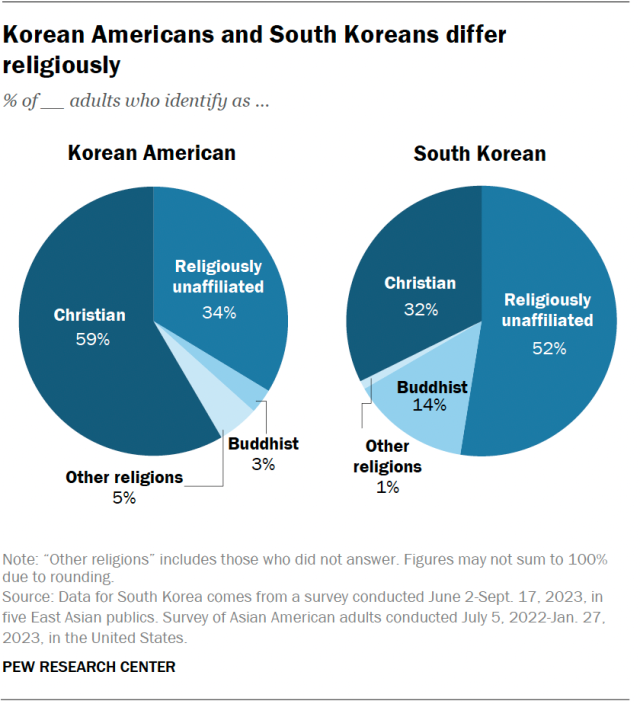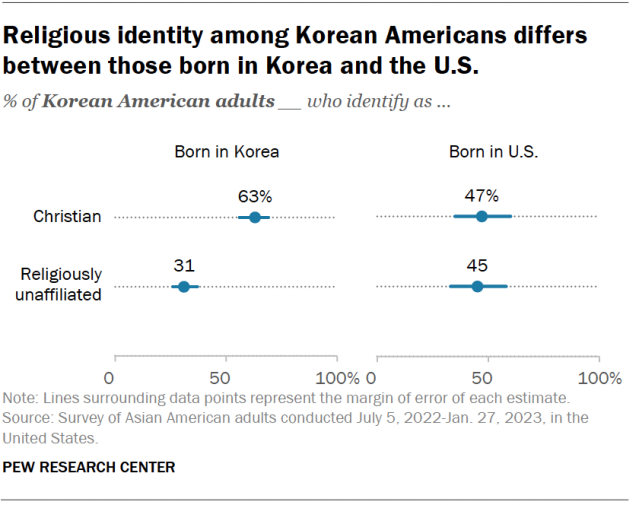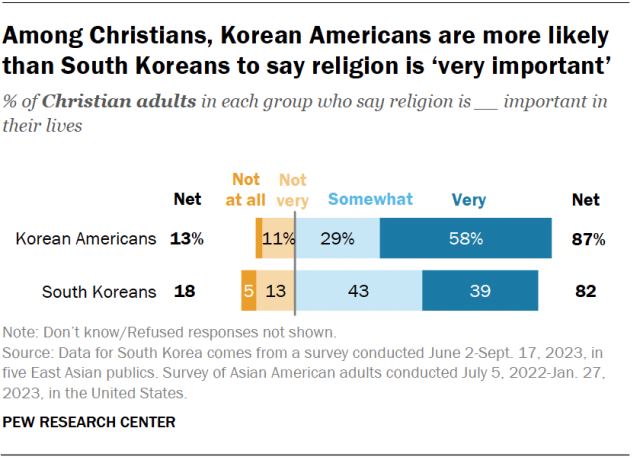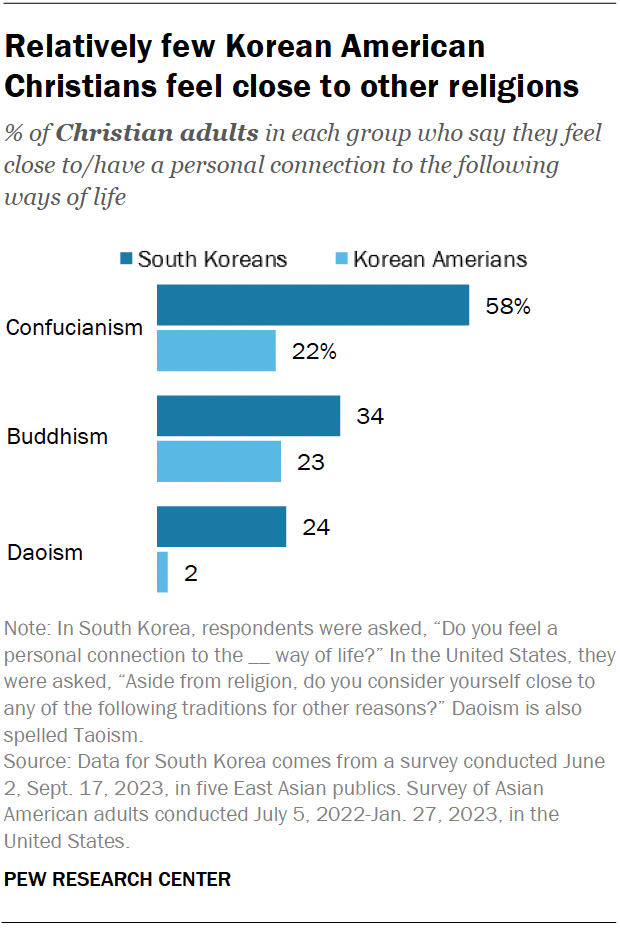
When it comes to religion, Korean Americans are very different from South Koreans, according to a new analysis of Pew Research Center survey data.

Korean American adults are nearly twice as likely as adults in South Korea to identify as Christian (59% vs. 32%). At the same time, Korean American adults are much less likely than adults in South Korea to be religiously unaffiliated (34% vs. 52%) or to be Buddhist (3% vs. 14%).
These religious differences between Korean Americans and South Koreans may be partly due to the faith backgrounds of immigrants who have moved to the United States from South Korea in recent decades. Migrants often go to countries where their religious identity is already prevalent, and the U.S. is the world’s top destination for Christian migrants globally.
In this analysis, we’ll take a closer look at religion among Korean American adults and adults in South Korea. The analysis is based on a survey of Asian Americans conducted in 2022 and 2023, as well as a survey of adults in East Asia conducted in 2023.
Pew Research Center conducted this analysis to explore similarities and differences between Korean American Christians and South Korean Christians. The data in this analysis comes from two Center surveys.
Data for South Korea comes from a Center survey of 2,104 adults in South Korea conducted as part of a broader study of attitudes in Hong Kong, Japan, South Korea, Taiwan and Vietnam. The survey was fielded from June 2 to Sept. 17, 2023. All interviews in South Korea were conducted over the phone.
The survey of East and Southeast Asia is part of the Pew-Templeton Global Religious Futures project, which analyzes religious change and its impact on societies around the world.
Data for the United States comes from the Center’s survey of 7,006 Asian American adults conducted in six languages from July 2022 to January 2023. The survey included 1,146 Asian adults of Korean origin.
This analysis was produced by Pew Research Center as part of the Pew-Templeton Global Religious Futures project, which analyzes religious change and its impact on societies around the world. Funding for the Global Religious Futures project comes from The Pew Charitable Trusts and the John Templeton Foundation (grant 62287). This publication does not necessarily reflect the views of the John Templeton Foundation.
Pew Research Center is a subsidiary of The Pew Charitable Trusts, its primary funder. The Center’s Asian American portfolio was funded by The Pew Charitable Trusts, with generous support from The Asian American Foundation; Chan Zuckerberg Initiative DAF, an advised fund of the Silicon Valley Community Foundation; the Robert Wood Johnson Foundation; the Henry Luce Foundation; the Doris Duke Foundation; The Wallace H. Coulter Foundation; The Dirk and Charlene Kabcenell Foundation; The Long Family Foundation; Lu-Hebert Fund; Gee Family Foundation; Joseph Cotchett; the Julian Abdey and Sabrina Moyle Charitable Fund; and Nanci Nishimura.
We would also like to thank the Leaders Forum for its thought leadership and valuable assistance in helping make this survey of Asian Americans possible. The strategic communications campaign used to promote the research was made possible with generous support from the Doris Duke Foundation.
For more information, read the Asian American survey’s list of questions and responses on religion, and its survey methodology. Also refer to the East and Southeast Asia survey’s full list of questions and responses, along with its survey methodology.
Religious identity among foreign- and U.S.-born Korean Americans

Among Korean American adults, 66% are immigrants from Korea, while 26% are U.S. born, according to our 2022-23 survey of Asian Americans. These two groups differ widely in their religious makeup.
Korean Americans who were born in Korea are about twice as likely to be Christian as to be religiously unaffiliated (63% vs. 31%). By comparison, Korean Americans who were born in the U.S. are roughly evenly split between Christians and the unaffiliated (47% vs. 45%).
Importance of religion among Korean American, South Korean Christians

Most Korean American Christians (87%) say religion is important in their lives, as do a similar share of South Korean Christians (82%).
However, Korean American Christians are much more likely than their counterparts in South Korea to say religion is very important (58% vs. 39%).
Connections to other religious beliefs or traditions

We also asked Korean American Christians whether they feel close to other religions: “Aside from religion, do you consider yourself close to any of the following traditions for other reasons?”
Korean American Christians do not feel as close to other religious traditions as South Korean Christians do. Only 22% of Korean American Christians consider themselves close to Confucianism and a similar share (23%) feel close to Buddhism.
By contrast, many Christians in South Korea feel a personal connection to at least one other religion’s or philosophy’s way of life. A majority of South Korean Christians (58%) say this about Confucianism, and 34% say the same about Buddhism.
The different levels of connection to Daoism (also spelled Taoism) are quite stark. Only 2% of Korean Christians in the U.S. feel close to Daoism for reasons aside from religion. In South Korea, 24% of Christians say they have a personal connection to the Daoist way of life.
(In the U.S., roughly 15% of Korean Christians chose not to answer each of the questions about a connection to other traditions. In South Korea, 10% of Christians chose not to answer the question about a connection to Daoism.)

